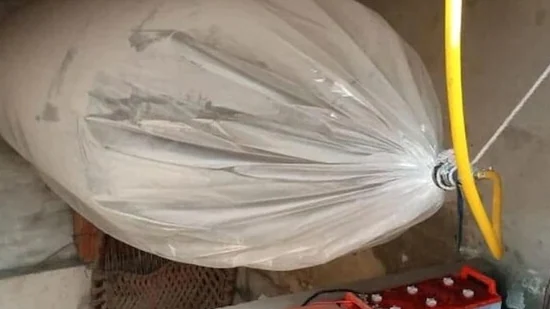India’s neighboring country Pakistan is going through a bad phase of economic crisis. The price of LPG in Pakistan has become far beyond the reach of common people. Amidst the economic crisis, continuously increasing inflation has forced people to buy and sell LPG in plastic bags. Here cooking gas stored in plastic bags is being sold.
If we ask you what you bring from the market in plastic bags, you will say – flour, rice or other things related to ration, but have you ever seen someone carrying LPG in a plastic bag? Your answer will be ‘no’. But, this has now become common in Pakistan. Here in Khyber Pakhtunkhwa, the largest gas producing province, distressed people are cooking food by filling gas in bags. Gas cylinders are out of reach of common people in this province. Experts are calling it a walking bomb.
India’s neighboring country Pakistan is going through a bad phase of economic crisis. The price of LPG in Pakistan has become far beyond the reach of common people. Amidst the economic crisis, continuously increasing inflation has forced people to buy and sell LPG in plastic bags. Here cooking gas stored in plastic bags is being sold. This is going on in full swing in Khyber Pakhtunkhwa, the north-western province of Pakistan. Here, instead of buying LPG cylinders, people are forced to fill some gas in small plastic bags and cook with it.
In the era of rising inflation in Pakistan, gas storage has decreased. Depleting gas reserves have forced authorities to reduce supplies to homes, filling stations and industrial units. A large population does not have a gas connection. Shortage of gas and availability of cooking gas and petroleum products at high rates is also a major reason why people are forced to adopt such methods. The high price of cylinders is making it more difficult for people.
People wait in line for 2 hours to get gas
According to Pakistani media reports, people in Karak district of Khyber Pakhtunkhwa have not been given gas connections since 2007, while the supply line of neighboring Hangu district, where gas is available, has also been broken for the last two years. Is. At the place where the pipe is broken, people stand in 2-hour long lines and carry gas filled in plastic.
How is it used…
In the shops connected to the gas pipeline network, LPG is filled in plastic bags at the rate of 2 kg, 3 kg with the help of a compressor. The nozzle and valve are tightly fitted at the mouth of these bags. According to a report in Pakistani media, it takes one hour to fill a 3 to 4 kg gas bag. These gas bags filled with LPG are then sold to people who use these bags as gas cylinders in their kitchens with the help of a small electric suction pump.
Highest gas production in Khyber Pakhtunkhwa
Let us tell you that maximum gas production takes place in Khyber Pakhtunkhwa only. In 2020, more than 85 lakh barrels of oil was produced while 64,967 million cubic feet of gas was also produced from the five fields here. Despite this, people in these areas are forced to take gas in plastic bags.
Gas is available in bags for 500 to 900 rupees
Due to the expensive prices of cylinders, gas is available in plastic bags for Rs 500 to Rs 900. Their price depends on the size of different bags. The compressor that fills it is available for Rs 1,500 to Rs 2,000. According to a report by Deutsche Welle (DW), a commercial gas cylinder is available for around 10,000 Pakistani rupees, which is not within the power of everyone to buy.
#Pakistan With no natural gas supply to homes, residents of Karak, carry gas for their household needs in plastic bags. They are literally moving bombs. Karak has huge estimated reserves of oil and gas, while to the #Karak people legal gas connections are not provided since 2007. pic.twitter.com/FMphcH6nUa
— Ghulam Abbas Shah (@ghulamabbasshah) December 29, 2022
How dangerous is their use?
This method of gas storage and use can be extremely dangerous. There is always a possibility of an explosion in this. Pakistani journalist Ghulam Abbas Shah has shared a video related to this on Twitter and has written – People who carry gas in plastic bags are no less than a walking bomb. According to a report by DW, 8 patients injured in the blast of these bags reach the Burn Care Center of Pakistan Institute of Medical Sciences every day. According to Dr. Kurtulain, Medical Officer of the Centre, this figure can become very big any day.


